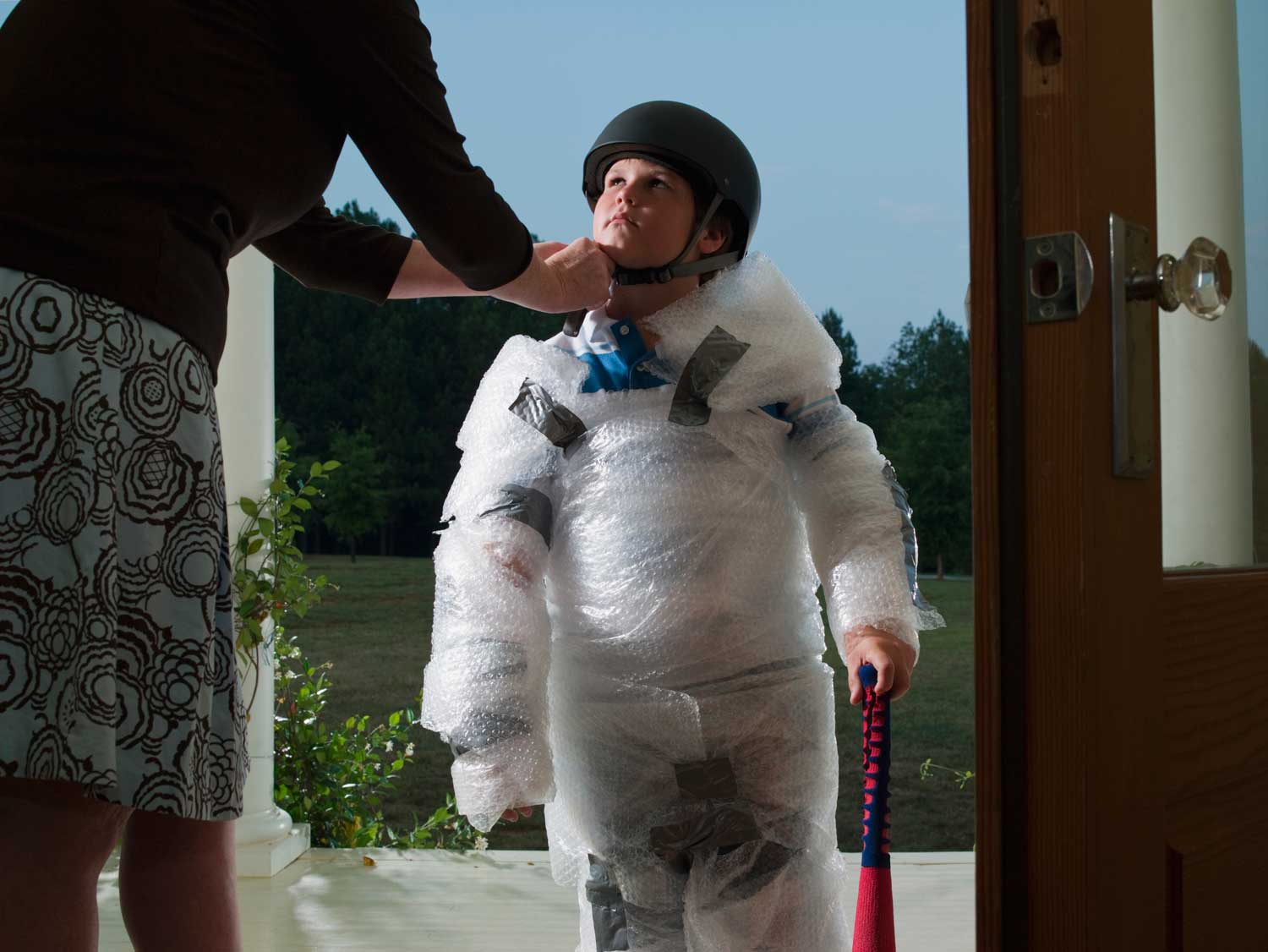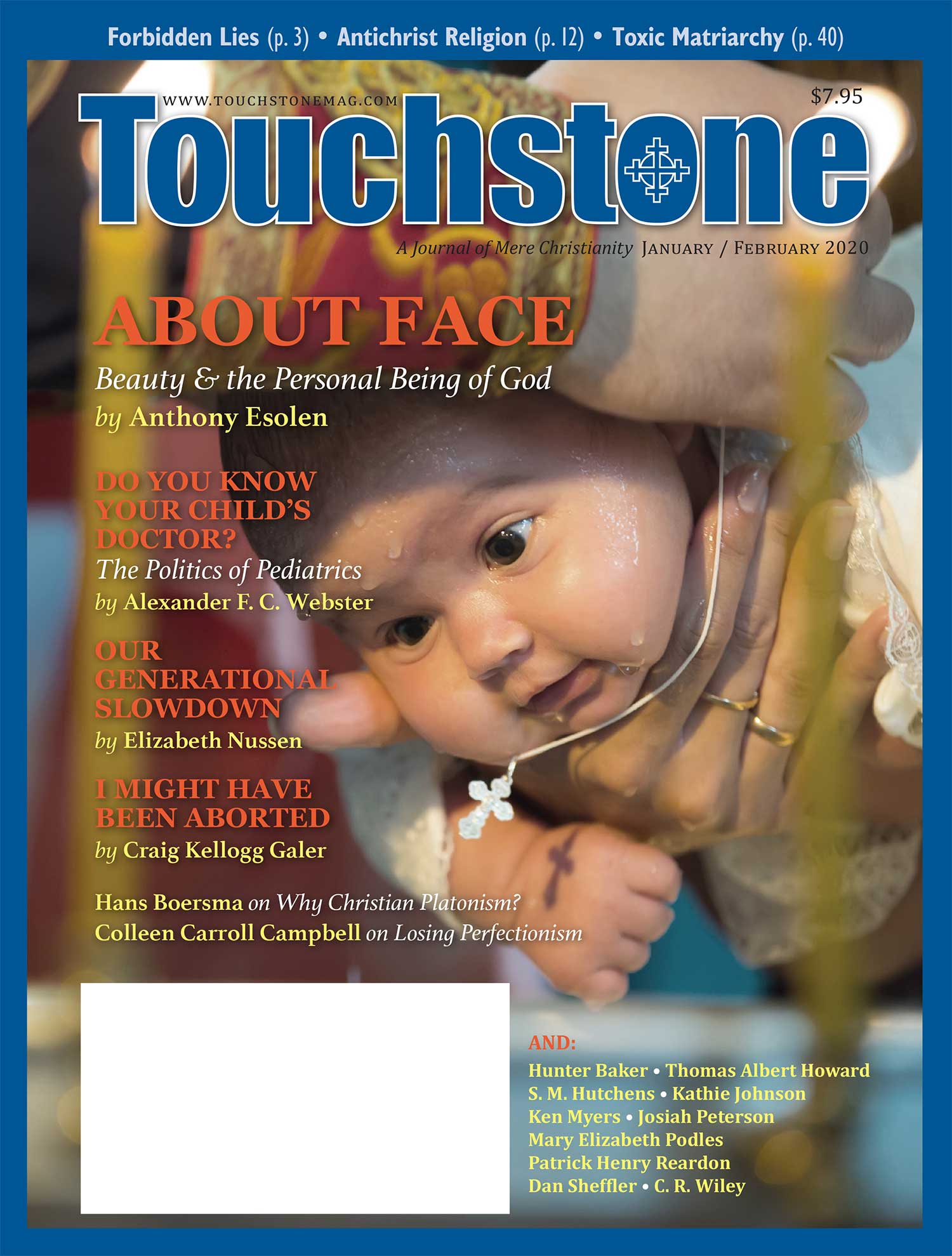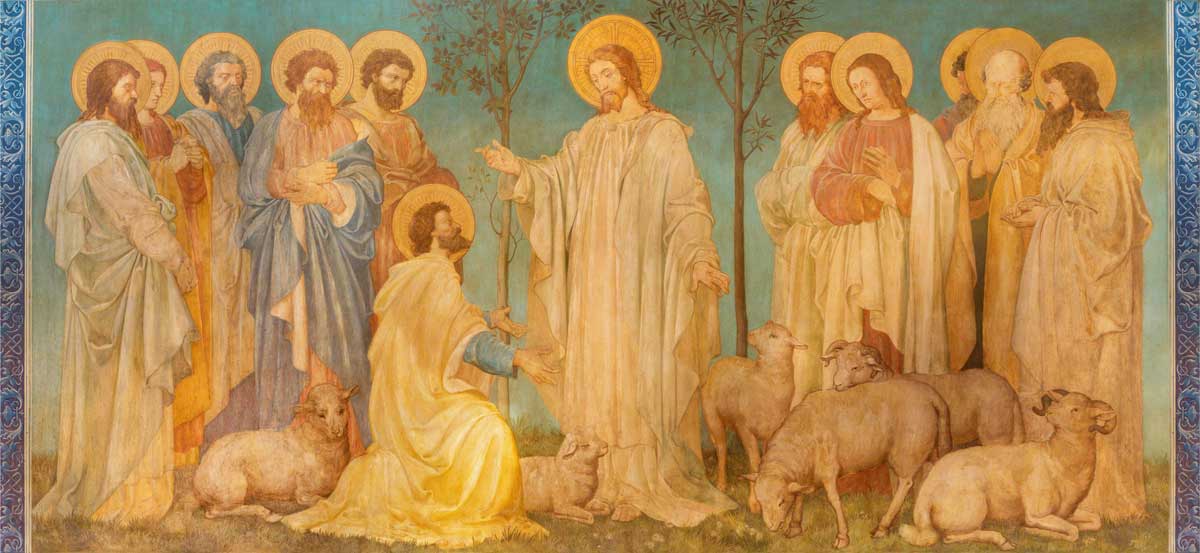Feature
Toxic Matriarchy
The Cure for Too Much of a Good Thing May Be Painful
The following essay is adapted from a talk delivered at the University of Idaho, in Moscow. Naturally, given its title, there was a protest, and even a police presence. But apart from heckling, everyone was fairly well behaved—and I confess that I enjoyed the banter somewhat. The audience also contained a healthy contingent of supporters. And there were some people who attended just to see what all the commotion was about. A number of them thanked me for the talk, and even expressed some embarrassment with regard to the protesters. Apart from the fact that I actually read Are You My Mother? to my audience, this is essentially the talk that I delivered.
When I was invited to give this talk, I was given a title and told, “Here, talk about this”; and I said to myself, “Well, that will certainly get some attention,” and I see that it has.
Since I had nothing besides a title to work with, I thought, “Well, this will give me an opportunity to deal with the problem of language.” Now, you may think that this is off topic, but it’s not. It’s the reason that we have protesters this evening.
The problem of language comes down to how things get named. Communication is never easy, but it’s gotten harder recently. There’s a long history to the problem. There’s Nominalism and the eclipse of Aristotle for one thing; then there was philosophy’s subjective turn with Descartes and those who followed; but of particular interest to me is something Paul Ricoeur called the hermeneutics of suspicion. And that’s what I’m dealing with right in this room.
In the second half of the nineteenth century, atheists (including Marx, Nietzsche, and Freud) claimed that human beings are not really governed by reason. Essentially we’re just animals motivated by passions that seethe beneath a civilized facade. Accordingly, people tend to use language to hide what they’re really up to, even from themselves. That’s why we should always be on the lookout for a scam. In the most extreme version of this hermeneutic, language can’t represent reality; it’s just a weapon, “a mobile army of metaphors, metonyms, and anthropomorphisms,” as Nietzsche put it.
When it comes to higher education, this is the way many academics think about language today. And this is why I’m not surprised that the title “Toxic Matriarchy” is greeted with suspicion rather than curiosity, as in “What an interesting title; I wonder what it could mean?”
Well, this is what materialism gives you. If we really can reduce reality to material and efficient causes, then even language is just one more way that the material universe gets things done. That’s not the whole story, of course—but it will do for now.
This makes dialectic impossible. Even when people actually believed that we have access to transcendent values, dialectic was painful and imprecise. But today we’re all like tourists who refuse to learn a foreign language and simply speak louder when others don’t understand, all the while complaining about the stupidity and mendacity of the natives. I am afraid we have descended into Babel. If you’re familiar with that story, you know what comes next.
But today I am here as a witness to the possibility that words can help us get outside our heads. And this is because in the beginning was the Word, and the Word was with God, and the Word was God. Nevertheless I am not God, and speaking truthfully is difficult. And there is a measure of truth to the claim that we do bend the truth. But we’ve always known this. We call it lying.
So I will try my best to tell the truth today. I don’t claim that I will get everything perfectly right. We look through a glass darkly, and we prophesy in part. But here’s my trigger warning: In the meantime, I may hurt some feelings.
The Free Gift of Motherhood
And now let’s turn to one of the great works in the Western canon—P. D. Eastman’s Are You My Mother?
I remember reading Are You My Mother? as a kid. You probably do, too. It’s been around a while. It was originally published in 1960. Later, when I had kids, I read it to them. It’s still remarkably popular. When I last checked, it was #530 on Amazon’s best-seller list.
It’s an amusing little story about a baby bird that hatches while his mother is away looking for food. Not content to wait, he sets out to find her. Along the way, he asks a cat, a cow, and even a steam shovel, “Are you my mother?” And right there on the cover of the book, the little guy is perched on the head of a dog, asking that same question, “Are you my mother?”
I suppose it’s remained popular because even very small children get the joke. And it’s a great book for mothers because it celebrates the bond that unites a mother and her child. And this is a beautiful thing, one of the most beautiful things in the world. I think we all believe this. It is one of the greatest consolations that a woman can enjoy. And it doesn’t get better by posting pictures of children on Instagram. The bond is precious because it is personal and exclusive. The only fame that a mother can really know as a mother is in her own household.
Now, I’ve probably just committed some sort of micro-aggression.
For one thing, the fact that there is a natural connection between biology and motherhood that even a child can see means that some people can never be biological mothers, no matter how hard they try.
In the Bible we have the story of the first human mother, and in that story we see that there is a connection made between the nature of motherhood and the name that she’s given. I’m thinking of Genesis 3:20, which reads, “The man called his wife’s name Eve, because she was the mother of all the living.” By the way, the name “Eve” sounds like the Hebrew word for “life-giver” and it resembles the word for “living.”
Perhaps you object to this because Eve doesn’t get to name herself. But not only didn’t she get to name herself, she’s referred to as “she.” And it gets worse; she didn’t even get a choice in this matter of being the “mother of all the living”—or even in this matter of living itself. Yet there she is, alive without her consent, and filled with all that latent potency, asked for or not.
Now, I’ve reduced this to the point of absurdity, but it didn’t take much work. I actually hear this sort of thing regularly, and I’m sure you have, too.
Receiving things that you didn’t ask for can be hard, but that’s the way that gifts can be. Your given biology may seem like socks for Christmas, but the world needs socks, and so do you. Any time you receive a gift, I mean really receive it, you subject yourself to someone else. And natures and names are gifts.
And motherhood is a gift, and the name that Adam gave to Eve is also a gift. And at least in God’s case, this is a free gift because he gets nothing that he needs out of it. It’s gratis, an overflow of his goodness. And it should be received with gladness.
Mrs. Belloti & Her Son
Given this, what should you make of the title of my little talk?
Well, it is possible to have too much of a good thing. Take wine, for example. Scripture tells us that it gladdens the heart—and I can testify to that. But too much doesn’t make you gladder, just the opposite. Ask any alcoholic, or a relative of one. But wine isn’t essential, you say. But it is, I say. But for the sake of argument, I’ll concede the point and proffer a different liquid. Let’s consider water. Now you can’t live without that. But you can have too much of it; some people literally drown in the stuff.
There’s my analogy. But does it really apply? Can we overdose on motherhood?
I’m a child of the seventies. We only had three television networks to speak of in those benighted days, so even short-lived television shows had larger audiences than some successful shows today. One of those shows was a sitcom that ran for only one season. It was called “HOT L BALTIMORE.” (The “E” in the hotel’s sign had burned out.) It was about a tenement house in, you guessed it, Baltimore. It was filled with the quirky flotsam and jetsam that you could find collected in places like that back then—you know, single middle-aged taxi drivers, older widows, starving artists—those kinds of people.
Anyway, one of the residents was a widow named Mrs. Belloti, and she had a grown son still in diapers by the name of Moose. Moose never came out of their apartment. He was just a mysterious presence above the lobby of the hotel. Occasionally he could be heard stomping around, accompanied by the laugh-track.
Today, psychologists might say that Mrs. Belloti and her son had a co-dependent relationship. Considering the number of young men living in their mother’s basements, I don’t think many people today would chuckle at this sort of thing.
In the course of the show, it became clear that Mrs. Belloti loved Moose to death. She couldn’t imagine him living without her. He needed safety and understanding. And like a self-fulfilling prophecy, she was right; her nurture was so enervating that Moose really couldn’t live without her. He couldn’t do anything for himself.
The show lasted only 13 episodes, so we never got to see if Moose ever got out of the apartment. Considering the fact that the show ended 40 years ago, and that Moose might still be up there, and that Mrs. Belloti is likely dead, Moose is probably now having his daily needs met by a visiting care provider.
I’m having a little fun. But I’ve known women like Mrs. Belloti. And they’re not just women anymore. And I’ve seen a proliferation of Mooses. And they’re not just grown boys.
Cling-ons & Their Mothers
The very institution we’re in right now is a kind of mother. “Alma Mater” means “generous mother.” And I think this is a fine thing. A university should be like a mother insofar as it nourishes its children with knowledge. But when I was young, we made fun of people who never graduated. We called them “cling-ons” because they wouldn’t let go of their mother’s skirt.
The purpose of nourishment back then was to make you strong enough to make it on your own. But I’m not sure that’s what many college administrators intend to happen these days. Instead, people are kept safe from unwelcome knowledge. Then they are passed on to other mothers—like progressive multinational corporations that promise to care for their employees so long as they never go home. But more likely your alma mater wants you to fall into the arms of the welfare state, which promises to care for you cradle to grave, just so long as you remember to vote for more of the same come November.
But it doesn’t stop there. Everyone is becoming more nurturing. Even men are becoming more nurturing without all the trouble and expense of having a sex-change operation. Now, there are times when a man should be nurturing. I’ve got nothing against it. But nurturance has risen to such a high level that it has become the master virtue. Everything, and everyone, must conform. I see it clearly among the clergy, even in ostensibly conservative denominations where women are excluded from the teaching and ruling offices. And in the homes of young couples, many guys lack any sense that they bring something to children as fathers. They aspire to be mommy second-class. You could say that in those homes Heather already has two mommies, and one of them is her father.
Some Biological Facts
Before going further, let’s just stop to remind ourselves about a fact of nature. None of us would be here without two parents—a biological mother and a biological father. For some reason, there is a tendency to emphasize one of them at the expense of the other. Reality is often bigger than the bed we have made for it. And smart people don’t try to shorten reality to make it fit their bed. Instead, they lengthen the bed of their understanding. Let’s try that.
First, let’s think about biological motherhood. Women come equipped to nurture children. There is the womb, naturally; we all began our lives in one of those. Our mothers kept us safe in that space whether they intended to or not. Their wombs shielded us from harsh realities; they even supplied us with food and oxygen. I suppose you could say that it happened “automatically,” but I don’t like the sound of that because it gets things backwards. Machines mimic humans, not the other way around. But most of the mothers I have known have been very intentionally pregnant—abstaining from alcohol, eating right. My mother told me that she even quit smoking.
And a mother’s nurture doesn’t stop after the baby is born. Scientists have discovered that what goes on outside the womb after birth looks more like what happens inside the womb than we ever knew. I think most people assume that children appear fully formed and then just get bigger after birth. But it isn’t so. The notion that you can separate a child from his mother right after birth without harming the child, as Socrates supposed in the Republic, is just plain wrong. Some biochemical developments occur only in the presence of a baby’s biological mother. And I’m not referring to what occurs during breastfeeding. As is often the case, the fact/value distinction so precious to modern thinkers proves to be untrue.
But this doesn’t mean that a child should never be separated from his mother. The health of both a mother and her child depend upon it. Over time, the bond between them must attenuate and even break. That’s when a new and healthy bond can form. But that break should come years later, and when it is time for that, a father is essential.
What I have to say going forward will be difficult for some people to accept. But sharp words can heal.
Two Stories
Allow me to tell you a couple of stories.
First story: I was present for the births of my three children. In the olden days, they put men in the waiting room. That was when having a baby was like having an appendix out. I tend to be hard on hippies, but there are two things I’m grateful to them for. One is the recovery of homeschooling. Before conservative Christians jumped on the bus, the hippies did the hard work of getting it going again and street legal. And second, I’m grateful that they brought back natural births.
So I was there for all the pushing and the blood, and I felt useless. I shouted the obvious, “Push!” and held my wife’s hand. Then, poof—there was a baby.
Then something happened each time that was very odd. I was presented with the umbilical cord and a pair of surgical scissors.
Now, I don’t know how this tradition got started. I suppose doctors felt bad leaving fathers with nothing useful to do. That’s the way many meaningful traditions begin, by accident. I think we should celebrate that, because it’s a hint that our intentions aren’t the only things that give meaning to the world.
But I recall the first time distinctly. I suspect that the doctor was a lesbian. Believe me, I went to Harvard Divinity School; I’ve been around lesbians. And it wasn’t hard to tell that she didn’t like me. But it didn’t matter; traditions are traditions. And there she was holding out the cord and the scissors. And in a flash I understood. I said, “Thank you,” but what I thought was, “You have no idea what this means, do you?” And then I cut the cord. I can still feel the sensation of slicing through that fleshy bond. I’ll never forget it.
Now for my second story: My church has a pretty good-sized youth group. And every summer, for the last fifteen years or so, 40 to 60 of us have gone down to West Virginia to help little old ladies with home repair, and then we take their grandkids to Vacation Bible School.
Now, because we go back to the same neighborhood year after year, many of our people have gotten to know some of the families in the community. And our young adults in particular have had a chance to see some kids transition from being children to being teenagers.
One summer, some of our leaders expressed their disappointment that all those years of “loving on” the children hadn’t kept them from using drugs or getting pregnant. There was even some talk about the futility of it all. Then a black teenager showed up. He was charming, and bright, and the team recognized him from years gone by. He told us that he would be going off to college at Marshall in the fall. And everyone was delighted. It seemed that in at least one case all that nurture had produced the desired result.
But the next day he came to drop off his siblings, and to inform us that he wouldn’t be back. When asked why, he said, “My father says I shouldn’t be going down to the church to flirt with a bunch of white girls from Connecticut.”
Naturally, our girls didn’t know what to make of this. But I smiled. And I said to myself, “I’ve got to meet this guy.” And when I did, my suspicion was confirmed. He was a man, and a big one, the sort you don’t mess with. And he was seated at the head of the table with his family all around, something like a miniature mountain overlooking a fertile valley. And everyone looked healthy and happy. He reminded me of other black patriarchs I have known. In fact, most of the healthy African Americans I have known have grown up with a father like that guy.
Nurture Gone Toxic
Now, I wouldn’t be here today without nurture. Even now, when I’m hurt or sick, I need it as much as anyone. And as I get older, I imagine I’ll need more and more of it. Nurture works by narrowing distances, by getting close, by feeling with, by giving care and shelter.
But I think there is too much of it today—and it’s become toxic. And I’m not the only person who’s noticed. The New York Times/Morning Consult published the results of a poll on March 16, 2019, entitled, “Snow Plow Parenting Scandal.” Here are some of the findings:
- 76 percent of parents remind their adult children of deadlines they need to meet, including schoolwork.
- 74 percent have made appointments for them, including doctor’s appointments.
- 15 percent of parents with children in college had texted or called them to wake them up so they didn’t sleep through a class or a test.
- 11 percent of parents of adult children have called their child’s employer if he or she had an issue at work.
- 8 percent of parents said that they had contacted a college professor or administrator about their child’s grades or a problem their child was having.
The result of all this help, of course is helplessness. We’re raising children who never grow up.
This brings me back to umbilical cords. When I cut them, I did it in something of the Spirit of the Lord during the days of creation. Hopefully you know what I’m talking about. The Lord made a series of cuts and separated things: light from darkness, water from land, and so forth. Then he named them and said, “Good.”
Throughout the Bible, God is said to be holy, which means “set apart.” And every time the heavenly choir appears, we hear that word, over and over: “holy, holy, holy.” And in Genesis 1, we see the creator distinctly; there’s no blurring the line between him and the waters.
Holiness opens space. Because the Lord stands apart, you do too. You are given your space. And you are also given a nature and a name. These make it possible for others to know you, and paradoxically, to commune with you.
Natures and names are the things that we lose when nurture goes toxic. When that happens, things level out and blend together, and we fall back into the sea of the formless void.
The Cure
Years ago, I told my wife I had two jobs: to protect her from the kids, and to protect the kids from her. I could see that I hurt her. But it was a healing cut. Today our kids are grown and healthy, and my wife is happy.
Now, here’s where my story of the patriarch comes in: Space makes room for judgment. You need it to see things in perspective. When a judge has a conflict of interest, we expect him to recuse himself. If he fails to do that, he compromises his judgment. This sort of thing also applies to the professorate. We’ve set up tenure so that professors don’t have to fear losing their livelihoods when they teach unpopular things.
In my second story, the patriarch kept enough fatherly distance to exercise good judgment. He used it to set boundaries for his son. This can be overdone, of course. And today we don’t like boundaries in principle, but that man’s family was surrounded by a sea of insanity; fortunately, since he had set a boundary, he managed to keep his son dry.
So, as you have probably seen, the cure for a toxic matriarchy is a dose of healthy patriarchy. Of course, patriarchy can go bad too—but you hear people talking about that all the time.
I suppose this has been an edgy talk, a bit sharper than you’re used to. But who said that surgery had to be painless to be good?
C. R. Wiley is a pastor and writer living in the Pacific Northwest. He has written for many publications, his favorite being Touchstone. His most recent book, In the House of Tom Bombadil, is available from Canon Press. He is a senior editor of Touchstone.
subscription options
Order
Print/Online Subscription

Get six issues (one year) of Touchstone PLUS full online access including pdf downloads for only $39.95. That's only $3.34 per month!
Order
Online Only
Subscription

Get a one-year full-access subscription to the Touchstone online archives for only $19.95. That's only $1.66 per month!
bulk subscriptions
Order Touchstone subscriptions in bulk and save $10 per sub! Each subscription includes 6 issues of Touchstone plus full online access to touchstonemag.com—including archives, videos, and pdf downloads of recent issues for only $29.95 each! Great for churches or study groups.
Transactions will be processed on a secure server.
more on Motherhood from the online archives
more from the online archives
calling all readers
Please Donate
"There are magazines worth reading but few worth saving . . . Touchstone is just such a magazine."
—Alice von Hildebrand
"Here we do not concede one square millimeter of territory to falsehood, folly, contemporary sentimentality, or fashion. We speak the truth, and let God be our judge. . . . Touchstone is the one committedly Christian conservative journal."
—Anthony Esolen, Touchstone senior editor










